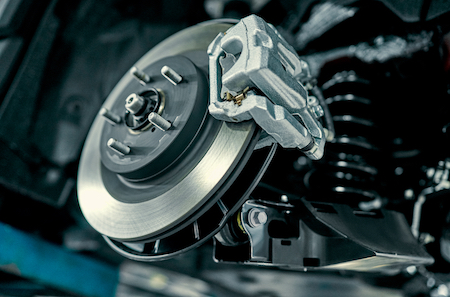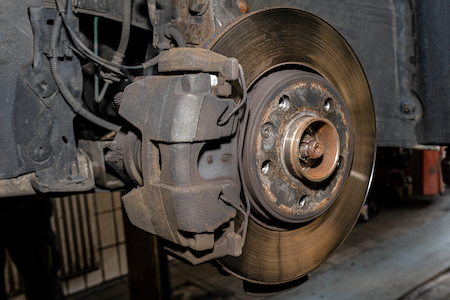Car maintenance for most people can be divided into two categories: the parts you understand, and the parts you don’t.
As a driver, changing the motor oil, replacing tires, and fixing the brakes when they squeak is pretty commonplace. We understand the process, know the warning signs, and fit those duties into our routines.
But what about digging deeper? What about maintaining your car’s brake calipers.
What are brake calipers?
Glad you asked.
What is a brake caliper?
The brake caliper is the part of a vehicle that pushes the brake pad to the brake rotor to effectively bring your car to a halt. It’s hydraulic, which uses fluid pressure to cause movement.
Brake calipers resemble a clamp, and partially frame the brake rotor. The caliper houses the car’s brake pads and pistons, creating friction as it slows the vehicle down. They are the heart of the braking system in vehicles that use disc brakes.
Overall, brake calipers have two functions:
1. They guide the brake pads. Brake calipers aren’t an on/off component. Instead, they’re used to guide your vehicle along based on traffic conditions. A little pressure slows you down. More pressure brings you to a stop. Brake calipers have a design feature that ensures the brake pads are always efficient and reliable for the overall braking process.
2. They convert brake fluid into mechanical movement. This process uses hydraulic brake fluid for the braking action within your vehicle. Without the brake caliper, this process wouldn’t take place as effectively as it does, keeping you safe in the process.
How do brake calipers operate?
To understand how a brake caliper operates, you need to step back and look at the entire braking system.
When you apply the brakes, a piston is pushed into motion, putting pressure on the brake fluid in the master cylinder. The brake fluid moves through hoses in the brake lines, from the master cylinder to the brake caliper.
This fluid pressure creates movement in the caliper pistons, resulting in the brake pads pushing forward to make contact with the rotor. Different vehicles use different types of calipers, which each have varying amounts of pistons. This squeezing action causes friction against the moving rotor, causing it to slow. More pressure means more slowing action, reducing the speed or bringing it to a halt altogether.
When you release pressure on the brake pedal, the situation reverses. Hydraulic fluid returns to the master cylinder, and the brake caliper pistons return to their resting position. It sits in waiting for the action to arise again.
As you step on the brake pedal, fluid pressure is released to all four wheels simultaneously, in the same quantity. This results in balanced braking, and ensures your vehicle’s safety.
What are the two types of brake calipers?
Brake calipers come in two categories: floating and fixed. They differ in design, mourning, and operation.
Floating calipers are compact and lightweight. They lack power when compared to a fixed caliper. Instead of being mounted rigidly to the rotor, they slide freely on lubricated pins and bushings. Hydraulics moves the piston and squeezes the inboard brake pads against the brake disc when you step on the brake pedal. That gives the caliper free movement to move along the rotor on the backside, creating clamping action as necessary for control and movement.
Fixed calipers have multiple pistons that make them more powerful than floating. They are more suitable when a lot of power is needed – racing cars or heavy vehicles that require a lot of stopping power. They have more braking force distribution, and produce a firmer, more powerful grip of the rotor as you press down on the pedal.
Both have advantages and disadvantages. Floating calipers are the most commonly used by manufacturers today. Check with your owner’s manual to determine which is used in your vehicle.
The signs your calipers need replacing
Whale brake pads will need replacing over the lifetime of a vehicle, brake calipers are designed to last the life of the car. That isn’t always the case. If they are damaged in any way, you’ll start to notice the way your car drives.
Vehicle pulls to one side when driving or braking
If your car seems to pull to one side while driving, the caliper may be the problem. The pistons move in and out from the hydraulic pressure from the master cylinder. If there is debris or corrosion, it can cause these pistons to freeze up. This will result in the brake pad being unable to connect properly with the rotor. The car will pull towards the side of the damaged caliper when the pistons fail, or away from the damaged side if the brake pad fails to connect with the rotor. This can happen while driving or during braking.
Squealing or rubbing noises
When parts don’t operate the way they should, they can create noise from the areas impacted. While brake pad damage makes a distinct noise every time you apply the brakes, calipers will produce noise whether the brakes are applied or not. When you notice a high-pitched squealing or a metallic rubbing noise while driving and it doesn’t go away, bring your vehicle in as soon as possible, as this can lead to complete brake failure.
Uneven brake pad damage
Brake pads are designed to last 30,000 to 70,000 miles. Because brakes are precise in function, both sides of the car should wear down at approximately the same time. If one brake pad is distinctly different than the other when you replace them, it could be a sign there is something wrong with the brake caliper.
Brake fluid leak
Anytime you notice brake fluid leaks around the car, it’s a sign of damage. Brake fluid is a light yellow color that may darken as it ages. If you touch it, it has an oily, slippery feel. If a caliper leaks, it may cause a slight oily spot on the ground inside the tire. Different things could cause this, so it’s important to inspect them as soon as possible.


